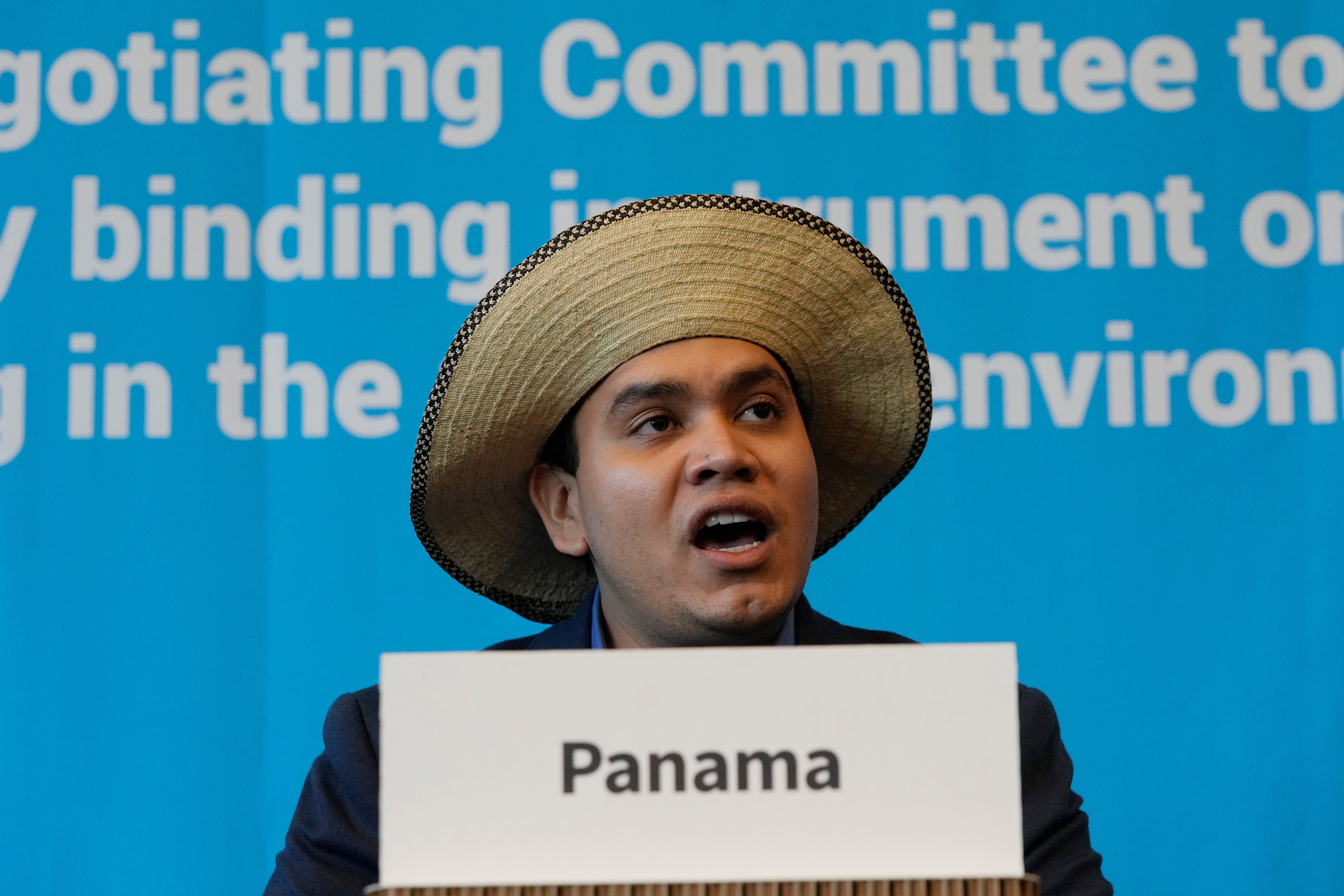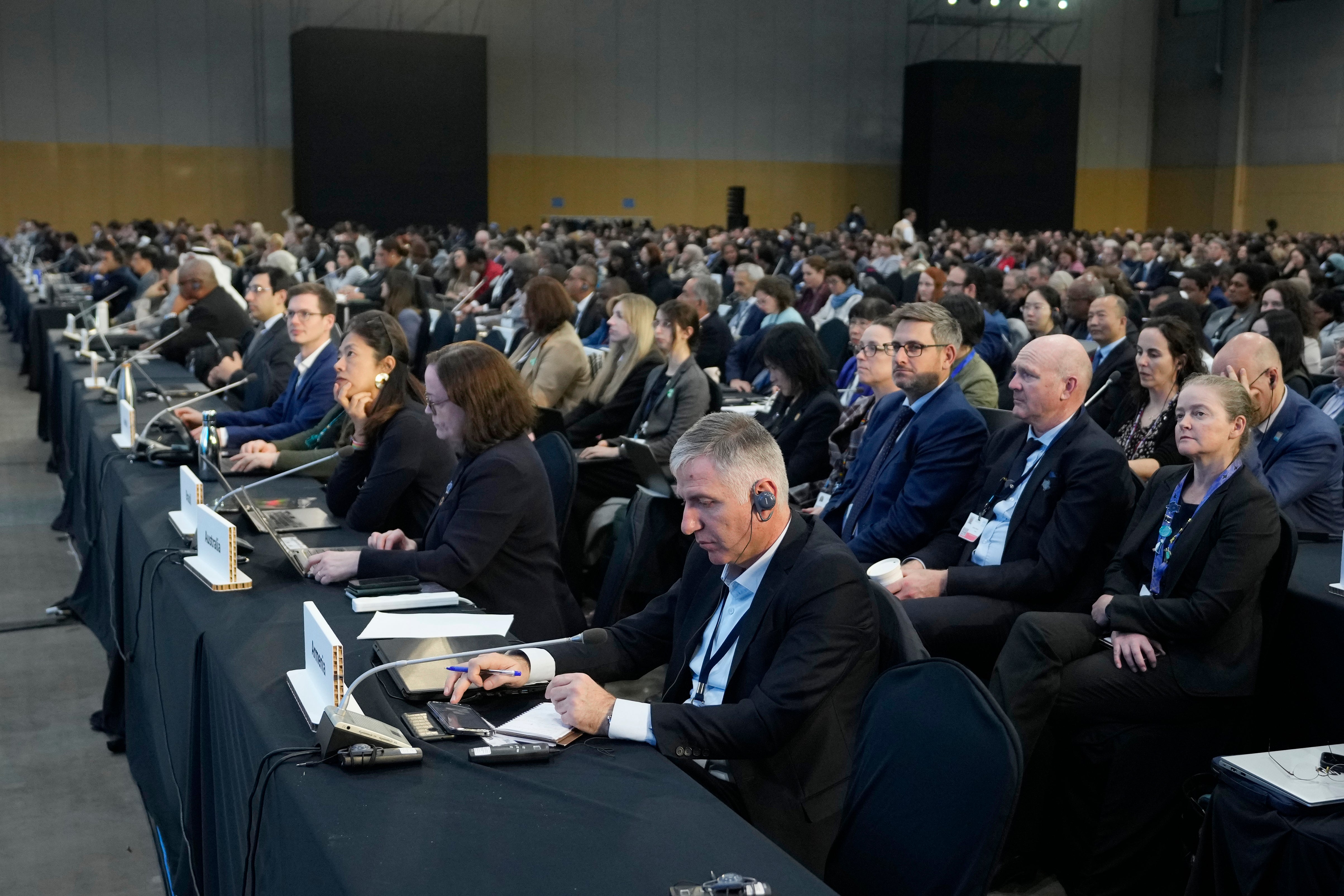Your support helps us to tell the story
From reproductive rights to climate change to Big Tech, The Independent is on the ground when the story is developing. Whether it’s investigating the financials of Elon Musk’s pro-Trump PAC or producing our latest documentary, ‘The A Word’, which shines a light on the American women fighting for reproductive rights, we know how important it is to parse out the facts from the messaging.
At such a critical moment in US history, we need reporters on the ground. Your donation allows us to keep sending journalists to speak to both sides of the story.
The Independent is trusted by Americans across the entire political spectrum. And unlike many other quality news outlets, we choose not to lock Americans out of our reporting and analysis with paywalls. We believe quality journalism should be available to everyone, paid for by those who can afford it.
Your support makes all the difference.
A week of tense negotiations to draft a legally binding treaty combating global plastic pollution ended in failure on Sunday night in Busan, South Korea, marking only the latest setback for global environmental diplomacy after disappointing outcomes at Cop29 and the Cop16 biodiversity summit.
The talks, which brought together nearly 200 countries under the UN Intergovernmental Negotiating Committee (INC-5), failed to resolve critical issues, including limits on plastic production, regulations on hazardous chemicals, and financial mechanisms to support developing nations.
Countries most at risk from plastic pollution rejected a watered-down proposal in the final hours, forcing negotiators to agree to reconvene next year. “We did not accept a weak treaty here, and we never will,” Juan Carlos Monterrey Gomez, of Panama, said at the plenary, receiving a long round of applause from delegates.
The failure to reach an agreement in Busan adds to a string of recent disappointments in global environmental talks. At Cop29 in Azerbaijan in November, countries managed a last-minute deal for $300bn in climate finance, far short of the $1 trillion target. Similarly, at Cop16 in Colombia in October, negotiations stalled over unresolved gaps in biodiversity funding.
Despite high expectations and hopes for a strong treaty, the Busan talks started to falter early on. Slow progress in meeting rooms, diverging views, and the heavy influence of fossil fuel lobbyists loomed over the week at Busan’s vast Bexco Exhibition Centre. Observers and negotiators were quickly openly discussing the road beyond Busan, as many said the talks were destined for failure.
The draft treaty text, released late on Sunday ahead of the final plenary, was riddled with brackets – a UN shorthand for unresolved provisions. These included a range of options on some of the most critical issues, including binding targets to cut plastic production.
In practical terms, the brackets symbolised a failure to achieve consensus. The ambiguity left those countries worst affected by plastic pollution and campaigners visibly frustrated, as it meant no clear commitments had been made.

Describing the state of the negotiations in the final days, Aleksandar Rankovic, director of The Common Initiative, said the talks resembled “a ballroom of clashing partners stepping on each other’s toes – and even breaking each other’s knees”.
A group of countries known as the High Ambition Coalition (HAC) called for another session before the final plenary on Sunday, saying a consensus on critical issues was impossible to reach in a day.
“If you ask me … we stop, we adapt the paper as it is and we try to do another session,” Senegal’s Cheikh Sylla said. That would offer time “to bring the positions closer together, and at this session … we can reach an agreement that is balanced.”
A major stumbling block was the question of production caps. Over 100 countries, including members of the HAC, pushed for global targets to cut plastic production and make it a legally binding feature of the treaty. With plastic production on track to triple by 2050, turning the tap off, as activists called it, or stopping the production of plastics, was the basis of this treaty.
“A treaty without clear legally binding rules is not acceptable,” said Camila Zepeda, head of delegation for Mexico, speaking on behalf of a hundred countries.
But petrochemical-producing nations like Saudi Arabia, along with their allies known here as “like-minded countries”, strongly opposed these caps, instead advocating for a focus on waste management. Several concerns, like a just transition away from plastics and the historic responsibility of high-polluting countries to provide finance, were also a point of contention.

These nations were accused of holding the negotiation process “hostage”.
“It is abundantly clear that these countries have no intention of finding a meaningful solution to this crisis and yet they continue to prevent the large majority of states who do,” said Eirik Lindebjerg, global plastics policy lead at WWF.
Graham Forbes, head of Greenpeace’s delegation, described the talks as “a marathon sabotaged by the very industries responsible for the crisis”.
“What we saw in Busan was a weaponisation of consensus by a small number of countries to stall progress and undermine the negotiations,” says David Azoulay, director of environmental health at the Centre for International Environmental Law (CIEL). “We must resist the idea that this process is destined to remain paralysed by obstruction.”
Others criticised a lack of political leadership. Mr Rankovic said some of the HAC countries were also “almost totally passive in the contact groups”.
“A negotiation like this requires the involvement of ministers, not outside, but inside the rooms,” Mr Rankovic said, adding that it was “up to ministers to find compromise”.
The exclusivity of the talks became another contentious issue. Meetings labelled as “informal” were closed to civil society, NGOs, and Indigenous groups. This sidelined key voices, particularly from the Global South, which relies heavily on civil society for technical expertise and advocacy, campaigners told The Independent.
“This is the most exclusive INC I’ve ever attended,” said Forbes. “Frontline communities are being locked out while fossil fuel lobbyists dominate the process.”
Bjorn Beeler, executive director of the International Pollutants Elimination Network (IPEN), said that the exclusion of civil society disproportionately disadvantaged developing nations.
“By removing high-ambition actors, you lower the ambition of the conversation,” he told The Independent. “Countries from the Global South depend on NGOs for critical information and expertise. Blocking their access effectively silences them.”
Financial support for developing nations remained a sticking point, as in the Cop29 and Cop16 talks. The plastics treaty was supposed to create a funding mechanism for a transition away from plastics. While the text acknowledged that it is the responsibility of the polluter to pay, it failed to provide such a framework.
At least 126 countries supported the creation of an independent, dedicated fund for treaty implementation, funded by a polymer production fee. However, the chair’s draft included only optional language, failing to establish concrete mechanisms for funding.
“This is a matter of life and death for Global South communities,” said Arpita Bhagat, plastics lead at GAIA Asia Pacific. “The chair’s text undermines this demand, leaving countries without the resources needed to address the crisis.”
Another critical omission was binding measures to regulate harmful chemicals. Plastics are laced with over 3,000 chemicals, many of which pose serious risks to human health and the environment. While campaigners pushed for strong controls, the draft weakened provisions on this front.
“The draft text strips away systematic controls on toxic chemicals,” said Mr Beeler. “We’re seeing weak language where there should be binding measures to eliminate these hazards.”
The consensus-driven nature of the negotiations further complicated progress. Unlike some multilateral agreements that allow voting, the plastics treaty negotiations relied on unanimous agreement. This gave a small group of petrochemical-aligned nations disproportionate power to block decisions. Senegal’s delegate Cheikh Sylla called it “a big mistake” to exclude voting.
Despite the failure in Busan, many believe the process can still be salvaged. Lessons from other multilateral environmental agreements, such as the Rotterdam and Minamata Conventions, show that deadlines can be extended without derailing the ultimate goal.
“This is a marathon, not a sprint,” said Mexico’s Zepeda, adding that delegates were preparing to return with stronger momentum next year.
“We have a coalition of the willing – over 100 countries that want this… We can start working together on a way forward.”
Gomez, of Panama, said: “Panama leaves Busan with fire in our hearts. We reconvene, the stakes will be higher, the devastation will be worse, and the opportunity to act will be even smaller.”
But for this coalition to succeed, many say, the process must change. Campaigners are calling for greater transparency, stronger inclusion of civil society, and decision-making mechanisms that prevent a small group of nations from holding the process hostage.

